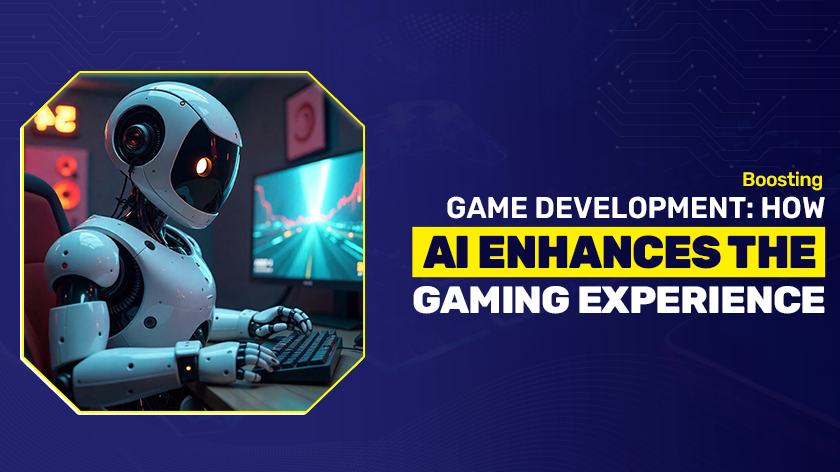The unique requirements of the consumer and technological advancements cause the game industry to constantly change. Artificial intelligence is the main force behind this industry’s growth (AI). AI improves several game production processes, giving gamers more immersive and interesting experiences. We’ll look at how AI is changing game creation and improving the gaming experience in the next part.
1. Intelligent NPC Behavior
The development of intelligent non-player characters (NPCs) is one of artificial intelligence’s greatest advances in gaming. Standard NPCs often had simple scripts, which made games boring and expected. NPCs can display more advanced behaviors thanks to AI, according to the moves and strategies of players. As a result, the playing field grows more dynamic, and players need to adjust their strategies and use analytical abilities to succeed.
-
Example: In games like The Last of Us Part II, NPCs use AI to coordinate their actions, making them react more realistically to the player’s movements. This not only heightens the challenge but also enhances the storytelling aspect, as players feel a stronger connection to the game world.
2. Procedural Content Generation
Procedural content generation, made possible by artificial intelligence, allows developers to create large, complex game worlds without having to manually design every single thing. With the help of algorithms, this method creates quests, goods, and environments dynamically, giving gamers a different gameplay experience each time they play.
-
Example: Games like No Man’s Sky and Minecraft utilize procedural generation to create expansive universes, ensuring that no two gameplay sessions are alike. Players can explore endless possibilities, making each adventure feel fresh and exciting.
3. Enhanced Graphics and Animation
AI algorithms can significantly improve graphics and animation quality in games. Techniques such as deep learning can enhance image resolution and texture quality, making environments more lifelike. Furthermore, AI-driven animation can create more fluid and realistic character movements, enhancing immersion.
-
Example: NVIDIA’s DLSS (Deep Learning Super Sampling) technology uses AI to upscale lower-resolution images in real time, allowing games to run smoothly while maintaining high visual fidelity. This results in stunning graphics without sacrificing performance.
4. Personalized Gaming Experiences
AI allows developers to tailor gaming experiences to individual players’ preferences and behaviors. By analyzing player data, AI can adjust game difficulty, suggest content, or even change storylines based on choices made by the player. This personalized approach can significantly enhance player engagement and satisfaction.
-
Example: Games like The Walking Dead series adapt the storyline based on players’ decisions, making every choice impactful. This personalization increases emotional investment, keeping players hooked from start to finish.
5. Smarter Game Testing
AI is also reducing the game creation process through automated testing. More quickly than human testers, AI-powered testing technology can find errors, performance challenges, and balancing issues. Developers are free to focus on creativity and innovation as a result of the reduced development time and expense.
-
Example: Companies like Ubisoft utilize AI for quality assurance, enabling them to release more polished games and improve overall player satisfaction. This approach not only enhances the gaming experience but also builds trust in the brand.
6. Voice Recognition and Natural Language Processing
Artificial intelligence (AI) technologies, including speech recognition and natural language processing (NLP), are increasingly integrated into games to foster more immersive and interactive experiences. Players can communicate with characters and manipulate game elements through voice commands, enhancing the overall gameplay by making interactions feel more natural and engaging.
-
Example: Voice recognition technology in Sea of Thieves allows players to provide commands and engage in informal, realistic interactions with the game world. As a result, players experience an increased level of immersion and feel completely plugged into the game.
Conclusion: AI is revolutionizing the gaming experience by making it more dynamic, personalized, and engaging. As technology advances, we can expect even more innovative applications of AI in gaming, leading to richer narratives, smarter NPCs, and breathtaking visuals. By embracing AI, developers can enhance the quality of their games and better meet the ever-evolving expectations of players.
At XcelTec, we offer cutting-edge AI tools and techniques to streamline your development process, enhance gameplay, and create immersive experiences. Explore how our AI solutions can transform your projects and set your games apart in this dynamic market.
Start your journey with XcelTec today and redefine the boundaries of gaming!
For more information: https://www.xceltec.com/
 :
https://in.pinterest.com/xceltec0192/
:
https://in.pinterest.com/xceltec0192/












